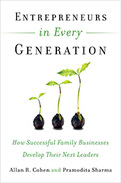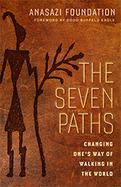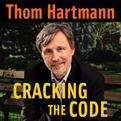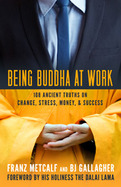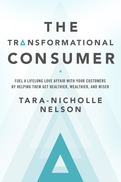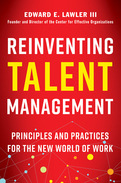Families are complicated; family businesses even more so. Like other companies, family-run enterprises must develop leadership and entrepreneurial skills. But they must also manage family dynamics that rarely mirror the best practices in the latest Harvard Business Review.
Allan Cohen and Pramodita Sharma, scholars with deep professional and personal roots in family businesses, show how enterprising families can transmit the hunger for excellence across generations. Using examples of firms that flourished and those that failed, they describe the practices that characterize entrepreneurial individuals, families, and organizations and offer pragmatic advice that can be tailored to your unique situation.
2013
This poetic, evocative story presents the meditations of an ancient Anasazi tribesman who rejects his family and sets off on a journey through the desert. He walks seven paths, each teaching a lesson symbolized by an element of the natural world: light, wind, water, stone, plants, animals, and, finally, the unity of all beings with the Creator. The Seven Paths reveals a source of wisdom, restoration, and renewal familiar to native people but lost to the rest of us, seven elements among nature that combine to mend human hearts.
Conservatives didn't intuit the path to persuasive messaging—they learned these techniques. There is no reason why progressives can't learn them too. In Cracking the Code, Hartmann shows you how. Drawing on his background as a psychotherapist and advertising executive as well as a nationally syndicated Air America radio host, he breaks down the science and technology of effective communication so you can apply it to your own efforts to counter right-wing disinformation.
As Hartmann explains, political persuasion is as much about biology as ideology, about knowing how the brain processes information and how that influences the way people perceive messages, make decisions, and form a worldview. Throughout the book, he shows you precisely how to master this technology—how to crack the communications code—providing examples dating from the time of the Founding Fathers to the present day.
2012
- Offers ancient solutions to today's workplace problems and provides new perspectives on timeless troubles
- For people seeking to bring spiritual values to work or seeking to discover new beliefs and values through their work
- Co-authored by Buddhist scholar Franz Metcalf and workplace expert BJ Gallagher
Buddhism has for thousands of years provided a spiritual foundation for the daily lives of millions of people around the world. But does Buddhism have anything to offer us-Buddhists and non-Buddhists alike-in today's world of work? Metcalf and Gallagher think it does. Spiritual wisdom, Western or Eastern, inspires and instructs us in living a good life. And that's just as true at work as at home.
Buddha mind-a source of calm, compassion, and insight-exists within each of us, not just the historical Buddha. Being Buddha at Work shows how to embody that mind in the stress and clamor of the workplace-how to tap into the Buddha consciousness so we can relieve daily tensions and greet challenges with awareness, equanimity, and good humor.
The book is divided into three sections. The first, "Becoming a Mindful Worker," covers Buddha's wisdom for our own work; the second, "Cultivating Mindful Work Relationships," focuses on how to work with other people; the third, "Creating a Mindful Workplace," deals with broader organizational topics. There is wisdom here for everyone-from frontline workers and team members, to supervisors and managers, to top executives and organizational leaders.
They are the most valuable, least understood customers of our time. They buy over $4 trillion in life-improving products and services every year. If you serve their deeply human need to continually improve their lives, they will eagerly engage with your brand at a time when most people are tuning out corporate messages.
They are Transformational Consumers, and no one knows them like Tara-Nicholle Nelson. Her Transformational Consumer insights powered her work at MyFitnessPal, which grew from 40 million to 100 million users in her time there.
Nelson takes readers on a hero's journey to connecting with customers in ways both profitable and transformational. After going inside the brains, emotions, and behaviors of Transformational Consumers, Tara issues a call to adventure: a rallying cry to leaders to shift their focus from simply making products to solving their customers' problems.
Nelson uses stories and cases studies from every industry to guide readers through this journey in five stages, shedding light on how to rethink their customers, their products and services, their marketing, their competition, and even their culture.
The key to growing a business today is not building an app or getting new social media followers. The key is engaging people over and over again by triggering their deep, human desire for growth and transformation.
When a company reorients every initiative to serve Transformational Consumers, it kick-starts a lifelong love affair with its customers—a love affair that results in unprecedented revenue growth, product innovation, and employee engagement.
The world of work has changed dramatically, says Lawler. Organizations now operate in a global environment. New technologies continue to disrupt how, when, and where work is done and should be managed. The workforce is becoming more diverse. Sustainability has joined profitability as a key business goal. All of this has dramatically accelerated the pace of change, making recruiting the best talent—not simply filling positions—an overriding concern.
But too many organizations still use a job-based, bureaucratic talent management approach that doesn't take into account how the world has changed. Indeed, a recent study showed that from 1995 to 2016, there was no significant change in the way HR spends its time.
Lawler says that talent management has to be reinvented. It needs to be closely linked to the organization's overall strategy. Recruitment and talent management should be driven by the skills and competencies the organization needs for long-term growth. This means talent management requires agile systems that can respond quickly to changing conditions and that take a more individualized approach to evaluating and rewarding performance. And everything talent management does has to be based on evidence, not tradition.
Lawler looks at attracting, selecting, developing, rewarding, managing, and organizing talent through this new lens. In today's world, organizations have to constantly reinvent themselves—and talent management must do the same.


